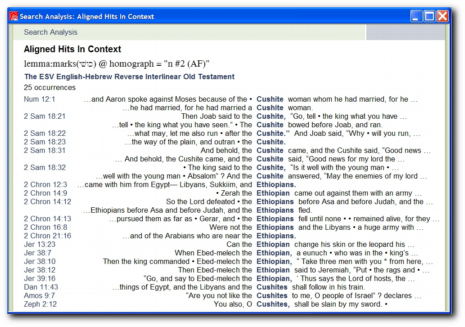Today’s Guest Blogger is Logos’ Director of Marketing, Dan Pritchett
One of my favorite features in Logos Bible Software is “Englishman’s Concordance”. Since I really don’t know Greek or Hebrew, it is one of the best ways for me to get the full flavor for any particular word I am trying to understand better in English. The “Englishman’s Concordance” feature shows me every time the underlying Greek or Hebrew word was used in the original languages and which word it was translated to in English.
So today, I stumbled upon an article written by John Piper called “Did Moses Marry a Black Woman?” where Piper states the following:
We learn in Numbers that “Miriam and Aaron spoke against Moses because of the Cushite woman whom he had married, for he had married a Cushite woman” (Num. 12:1). A Cushite is from Cush, a region south of Ethiopia, where the people are known for their black skin. We know this because of Jeremiah 13:23: “Can the Ethiopian [the same Hebrew word translated “Cushite” in Numbers 12:1] change his skin or the leopard his spots? Then also you can do good who are accustomed to do evil.” Attention is drawn to the difference of the skin of the Cushite people.
As I read that paragraph I wondered how many times the actual word in Hebrew that Piper is referencing was translated “Cushite” and how many times it was translated “Ethiopian” and how many times it was translated something else. So I fired up my Logos Bible Software and went straight to Numbers 12:1 and took a look at it in the ESV English-Hebrew Reverse Interlinear Old Testament, right-clicked on “Cushite” and executed “Englishman’s Concordance”.
As you can see in the screenshot כושׁי appears 25 times in the Old Testament and is translated “Cushite” or “Cushites” 13 times, “Ethiopian” or “Ethiopians” 12 times.
I went on to study the subject in many more ways thanks to the Topic Study, Word Study, and more, but it just reminded me how useful the “Englishman’s Concordance” can be for quickly seeing how the exact same word in the original text can be translated into different words in English. It is a blessing to be able to read multiple translations of God’s Word in my native tongue, but a reminder to me that there is no substitute for the original language of the text.





